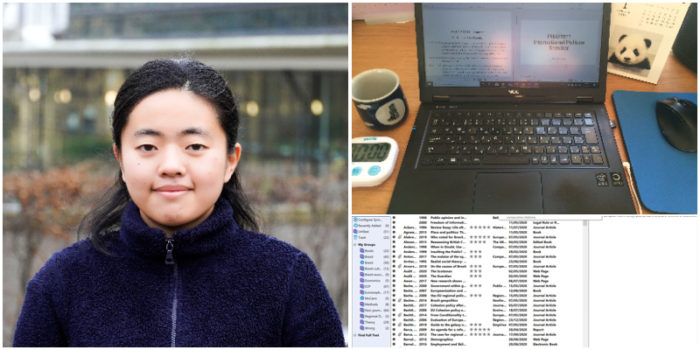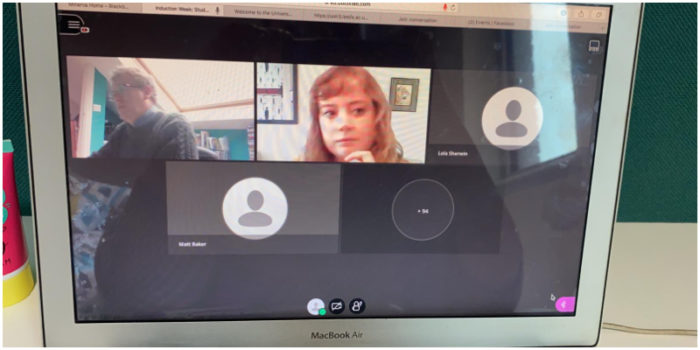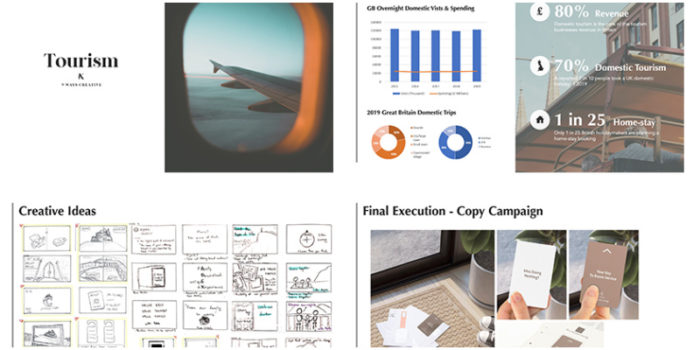Online Learning Reflection

Hi there! With the new semester about to start, we thought this would be a great opportunity for us to share how we have studied online last semester. Our wonderful ambassadors, Adeline, Joceline, Marina and Sara would like to share with you first-hand how we have studied, coped, taught, and overall enjoyed our online learning at the University of Leeds last semester. We hope that this will not only give you a good idea of how you may be learning this semester, but also learn tips on how we can keep motivated and enjoy learning in an online environment!
Sara Kaizuka, PhD in the School of Politics and International Relations

Learning and Teaching Online as a Postgraduate Researcher (PhD)
Researching online has had its ups and downs. For some Postgraduate researchers (PGRs), this has been a difficult time with limited access to labs and difficulty in conducting fieldwork. Despite such challenges, this has also been a great opportunity to try out new ways of networking and researching! With everything moving online, what I found as a PGR is that this has opened new opportunities which I have missed during face-to-face learning. Equally, teaching for the first time in the last semester had been a steep learning curve for me as it was done online. However, I found teaching to be one of the most fulfilling things I have done during my research degree and learned many new things. If you are a taught student, it may be interesting to hear how us staff have prepared for teaching online. Here, I will share my experience trying to network online, accessing library resources, utilising the workshops to gain valuable skills for my research, and how I adapted to teaching online.
Networking
Networking is an important part of doing a research degree and being a student at the University of Leeds gives you a great opportunity to do this. This can be daunting for some, but I found networking online to be easier and more enjoyable than doing it face-to-face. For example, I was able to participate in an online webinar held by academics, journalists, and council workers and listen to their presentations last semester. I am, like many of my colleagues, a shy person and generally find it difficult to ask questions. I also find it difficult as an international student to ask questions in English during Q&A. However, I was able to confidently ask questions using the chat function at any time during the webinar as it gave me more time to think about my question and get instantaneous response!
Another great thing about webinars is that you can Google the participants as their full names are displayed (no need to scribble down names as they are introduced only to realise you misspelled them!). I can then look up their works and even network with them by using my LinkedIn account or emailing them later to ask follow-up questions. This would have been very intimidating to do if it was done face-to-face, but I felt more confident doing so as everyone seemed eager to meet new people online.
Library Resources
I also appreciated the vast number of resources I could access through the University of Leeds online catalogue. Last semester, I utilised the Click and Collect system to get my hands on physical books. Now the library offers an even more convenient Delivery system where they will deliver Library books to your UK home for free! If you are in the UK this semester, please utilise these services to access physical library books and online resources through the library website.
Skills Development Through Online Workshops
Obtaining new skills is also an important part of doing a research degree, and the University of Leeds gives great support in this regard. These workshops can be directly related to your research or something completely different that can help you widen your skills. They are taught by highly qualified experts and I can tell you that I learned more in just 1 hour of these workshops than I could have ever imagined! Some of the workshops I joined were not directly related to my research, but half a year later I realised how essential they have been to my research and work. So I encourage you to check the workshops available to research students (there are also ones aimed at taught students and international students). The following list of workshops are the ones I have taken that I found particularly useful:
- Word for Thesis: You might think you know all about using Microsoft Word, but after taking this workshop I realised how little I knew about using Word! There are several different levels for this workshop depending on how far you are in your research. I strongly recommend taking this as it is vital for anyone using Word. I assure you that you will definitely find new features to Word that you never knew before!
- Inclusive Teaching: This has been one of the most important workshops I have taken during my time at the University of Leeds. This workshop teaches you how to create teaching material suited to not only people with disability, but also international students and mature students who require additional support. It taught me how to create Word documents and PowerPoint slides that will be easy to read for people from diverse backgrounds. I use the skills I learned here not only in my teaching but also when I write emails and do presentations.
- EndNote: a third-party software provided by the University of Leeds where you can store your reading resources and automate your referencing. Not only is this a great time saviour once you get the hang of it, but also a great way to organise your reading. As a researcher, your reading resources can pile up and you will not be able to keep a track of what you have read and what you were planning to read. Before I took this workshop, I had no idea of such a software and had been manually creating my reference list and keeping track of my reading on my notebook. I will be honest, it took me months after taking this workshop before I became confident using this software. But I genuinely feel I learned a lot from taking this workshop and all the trial and error from trying to figure out how to use this software has boosted my confidence in using software! EndNote can be tricky to utilise, but I highly recommend taking this workshop.
Teaching Online
One of the great things about doing a research degree is that you will have the opportunity to teach undergraduate students! This is not only a valuable experience working as a teacher, but also an opportunity to reflect on your own research. In the last semester I was given about a week to prepare for online teaching. But after taking workshops on teaching prior to starting, and with the help of other teaching staff, I was able to teach with confidence! I also joined the teaching community at Leeds where I could share my experience of teaching and learning from other staff. Teaching online is very different from teaching face-to-face. On average, you have to plan much more carefully and create a higher degree of structure to your teaching which can take time. You also have to be prepared for technical difficulties that you and your students may face at any given time. From a teaching perspective, it is very important that students come forward if they are finding any difficulties. This allows me to better understand their issues and plan how I can direct them to the best support offered by the university. From my experience, teaching staff really care about the wellbeing of the students and are constantly searching for better ways to teach online. Most staff including myself have learned valuable lessons from last semester by trying out new teaching methods and we are confident we can provide an even better learning experience for students this semester!
Marina Abey Thomas, MA New Media

I arrived at Leeds in September 2020 to join my course MA New Media, all nervous and uncertain of what the future held for me. Joining the University during the pandemic seemed very difficult. This was the first time that I was travelling out of Asia and very far from my home country, India. I had doubts over how my classes will be conducted and how am I going to gain the experience of an academic year, through a virtual scenario. But fortunately, all my fears were put to rest as the Induction Week began.
I met my programme leader and professors virtually and continued to receive a huge amount of support. During Induction, they were very encouraging and cleared all the concerns I had in my mind about online learning. They assured that even though this is a new concept of teaching for them, we, the students will receive the best of quality and experience. Over the next few days, as my classes began, my lectures were conducted through Microsoft Teams, Blackboard Collaborate and Zoom, while pre-lecture notes and presentations were shared on the student portal, Minerva. Initially, I did find it a little difficult to adjust to the setup, but it got better as I started managing my time as if I was attending the lecturers in person.

I also found it really convenient that most of the books which I had to read as a part of my module curriculum, were available online in the University’s library portal. In addition, the library had accessible study spaces, where, while maintaining social distancing, one could find moments of peace to focus on academic work. However, personally for me the highlight of learning through online classes was that every classmate of mine and our tutors were all in the same boat, with the technology binding us.
Even though we had initial hiccups, braving through technical difficulties and communication issues, I had a very enriching first semester. Here’s looking forward to second semester.
Adeline Wong, MA Advertising and Design

Transitioning from an Undergraduate degree to a Taught Postgraduate degree was comparatively more intense in terms of study hours and content (and a year of study is also slightly longer!). But with the support that the University has given, including online resources such as “Step Up to Masters” and the guidance from my personal tutor, this transition was made easier for me.
What I found different, was that a more advanced comprehension and engagement with the course content was expected at a Taught Postgraduate level. It also required a higher level of responsibility for engaging in my studies outside of lecture content. One thing emphasised by my course tutors, was to begin developing a clearer understanding of what I wanted to get out of the course and its relevance to my future plans.
Being able to be in Leeds despite online learning was very beneficial to me. With some of the University’s facilities and libraries remaining open, I am able to access support and resources I required, as well as socially-distanced study spaces where needed. (And of course, there was also no time difference to consider!)
The first semester of online learning went very well for me, and I was able to adapt to the online format of lectures quite quickly, having previously completed the final weeks of my undergraduate degree online as well. Whilst it did take some time to figure out a good routine, I thoroughly enjoyed being able to use my time more flexibly (especially being a night owl!). However, as some of my creative-based classes were in the form of workshops and group projects, those classes took a bit of time to get used to.
As I was starting a new degree, it did take some time to get to know other students on my course (as I’m on the shyer side!). Classes involving group work and discussion went better than I expected, as this was the first time I had worked on group projects completely online. Though the first semester went by very quickly for me, I very much enjoyed getting to know people and taking part in different activities both academic and outside of my studies.

As online learning can sometimes be difficult, here are some tips that I have found useful for me to stay focused and productive:
- Time management and self-discipline
I try to keep a daily/weekly routine even if lectures are pre-recorded, scheduling and blocking out hours where I will work on a specific module. This ensures that I’m able to get everything done throughout the semester.
- Creating a comfortable environment with minimal distractions
For me, this means being as far away from my bed where possible! I’ve also decorated the area around my desk and the wall above it, with things that make me happy, including gifts and birthday cards from friends, prints from my favourite artists, and my own art too.
- Working with others to stay motivated
I sometimes choose to work within my support bubble to keep each other motivated and accountable (and with video call, this does not even have to be in-person for friends outside of my bubble!).
- Make sure to always ask for help if you need it
With online learning, it can be harder to following along so make sure to ask for help if you need it. The teaching staff are usually happy to continue discussing and answering questions outside of contact hours. Skills@Library also provide a lot of support and workshops such as project management or academic skills. (And don’t forget, your personal tutors are also there to support you!)
- Remember to take breaks and stretch
It’s easy to get caught up in work or lectures, especially when you do not need to move between lecture theatres. So always remember to get up and stretch every so often, or grab a snack or a drink and take a break. (It’s also good to give your eyes a break and look at something other than a screen!)
- Go for a walk and get some fresh air
It’s also good to take a break by going outside, whether it is a run as part of your exercise routine, or just a walk outside (following government regulations of course!). St. George’s Fields on the University campus or Hyde Park are two of my favourite places to go to for a walk, and it always helps improve my mood and take my mind off studying for a bit.
Joceline Kamajaya, BSc Medicinal Chemistry

Moving to online learning in my second year has been interesting to say the least! Initially, it was quite daunting as it was something that I have not previously done. However, now at the end of the first semester, I can gladly say that it has went incredibly well! All of my classes have been moved online, with the exception of some lab sessions. During the face-to-face lab sessions, social distancing measures were put in place and students had their own designated work area as to not move around too much and risk spreading the virus if they had it. As for online learning, I enjoyed the balance of synchronous and asynchronous sessions (or known as live and recorded sessions!). Most of the course content was delivered via pre-recorded lectures and we were provided with PowerPoint slides, additional readings, and annotations for those slides as well. During live workshop sessions, we would work on a set of questions provided to us beforehand. Usually, we would be placed into breakout groups to discuss, before returning to the main room and having our professor review our answers and clear some misconceptions.
One of the most challenging aspects of online learning is time-management. With less live sessions and no set schedule, it can be hard to motivate yourself to study and stop procrastinating. I find that creating my own schedule can be quite helpful, and I schedule everything down to the last minute. This includes eating, cooking, and even taking breaks! This gives my day to day life some structure and keeps me accountable. Additionally, I would often study along with my friends, which makes things much easier. Another issue that has been quite common among students are breakout rooms! It can be quite awkward at first, but slowly I was able to gain confidence and start speaking in them. The key thing to remember is that everyone else is as nervous as you are! I find that once one person starts speaking, a few others will join in and a discussion can start. With the pre-recorded lectures, I must admit that I enjoy them a lot. Having them recorded gave me the freedom to pause or speed up the video at any time, thus making my learning experience much more smoother. I was able to speed up any sections that I have understood, but also pause and replay bits where I did not completely understand the topic. It also gave me the liberty to pace my own studies, as I enjoy doing most lecture recordings in one sitting rather than having them spread out throughout the week. And even during times where I could not understand topics that well, my professors have been incredibly supportive and helpful. They have opened up online discussion boards, do weekly office hours, and opened up their email for any queries. One of my professors even replied my email within 5 minutes! Additionally, I was able to reach out to my personal tutor at all times and arrange multiple meetings throughout the semester. This form of support reassured me that I was not alone even when I am unable to meet or see them physically.
Overall...
Shifting to online learning has been a big challenge, both for the staff and students alike. Despite the challenges that we all face, the University continues to provide amazing support for its students, whether that may be academic or wellbeing. As a student, if you ever feel like you are struggling, don’t hesitate to reach out, whether that may be to your personal tutor, your professors, or your school. Be assured that they will be glad to provide support! Below are some useful webpages to visit for information, or you can always reach out to us, either via email or live chat at Link to Leeds.
To stay updated regarding any changes during these times at the University of Leeds Coronavirus website.
If you have any issues/concerns regarding online learning, you can find support here.
This is the link to contact your respective schools via email.
Find out what services the library is providing here and what services you can access on-campus here.
